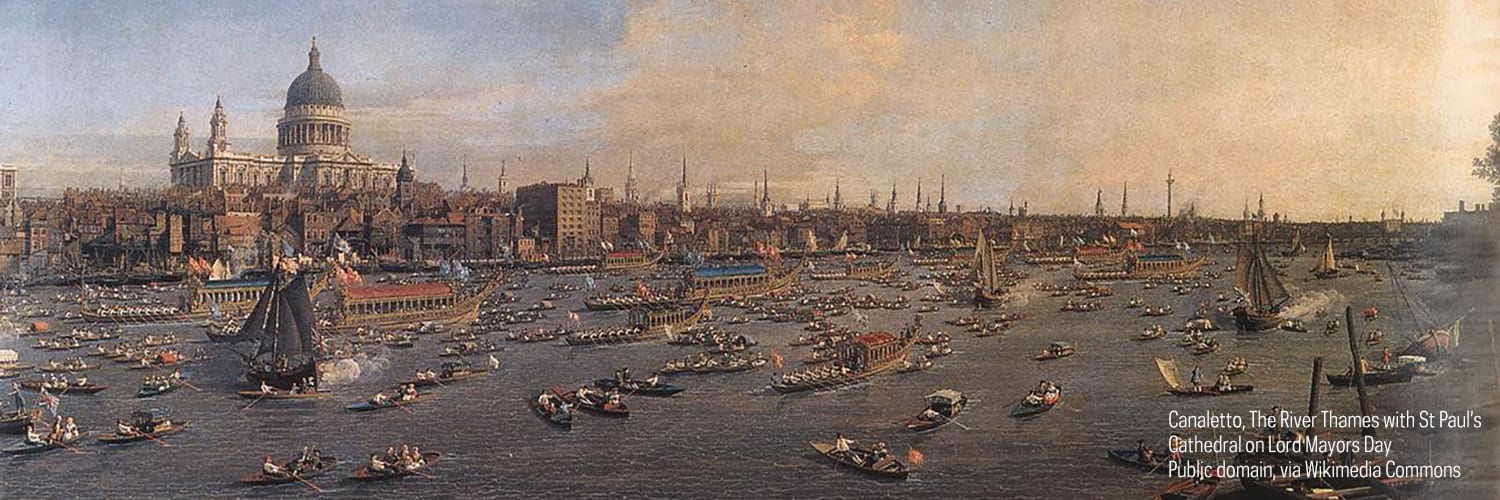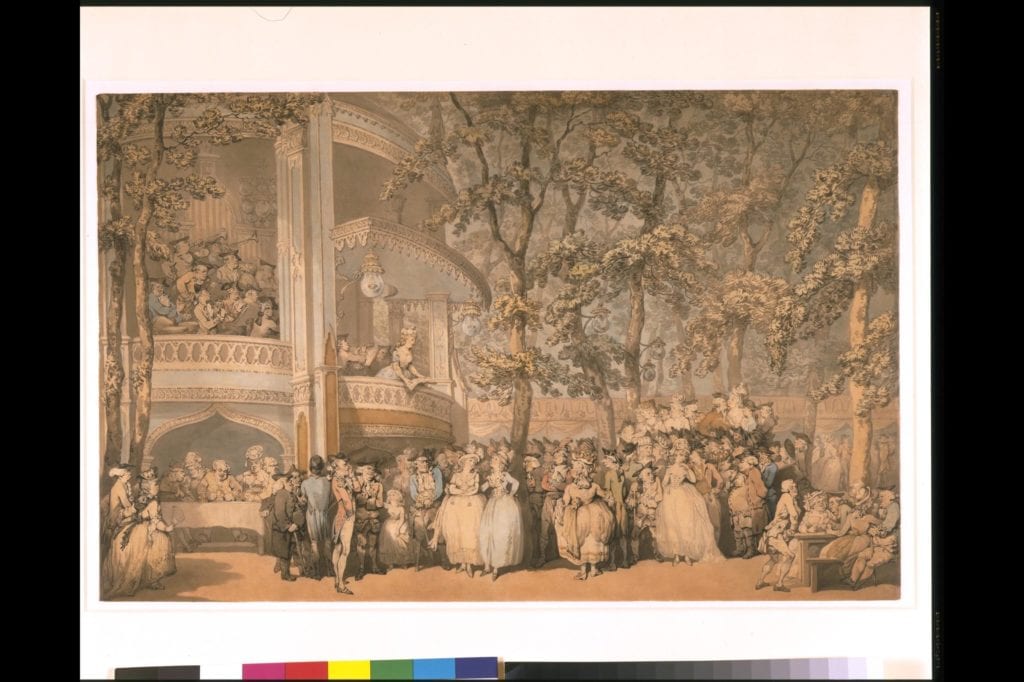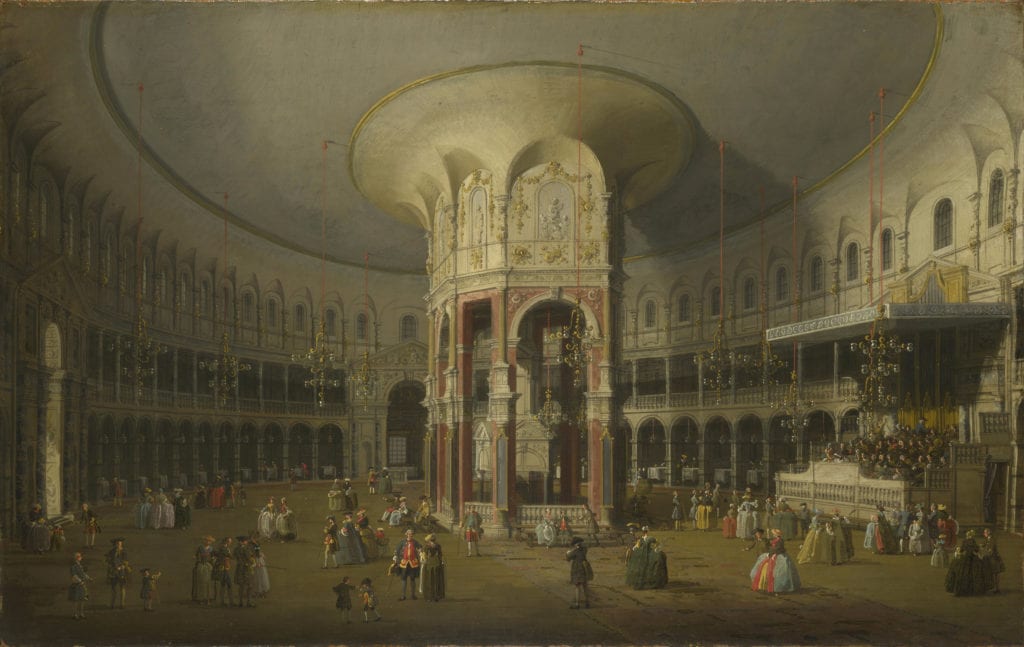The Jolly Young Waterman

In week 2 of our book club, we will discuss the song "The Jolly Young Waterman," which was originally written by Charles Dibdin for his ballad opera The Waterman: Or The First of August in 1765. We will read the original play and think about what happens to the song once it has passed through the oral tradition.
Charles Dibdin
Presented by Ian Newman
This video explores Dibdin’s life and career, from his early days on the stage acting at Covent Garden alongside David Garrick, to his development of the one-man show.
The Pleasure Gardens: Ranelagh and Vauxhall
Presented by Ian Newman
“The Jolly Young Waterman” features a Waterman – named Tom Tug in the play The Waterman – who rows people up and down the Thames. We’re told that he works at Blackfriars Bridge, and that he takes parties of ladies to Ranelagh and Vauxhall. These were both resorts for fabulous entertainments in the late eighteenth-century and were quite unlike anything that now exists. There were several of these Pleasure Gardens in eighteenth-century London, with varying reputations. All of them were on the outskirts of London and most of them were built up around natural water sources. Many started off as taverns before developing into popular entertainment venues. As David Coke and Alan Borg explain in their compendious volume Vauxhall Gardens: A History, these were “‘gardens’ only in that they were out of doors; the great attraction of these sites, as opposed to horticultural or botanic gardens…was that they came alive at night, a real novelty for Londoners.”
The first of these gardens was at Vauxhall, which was established in 1729 by Jonathan Tyers. The site had previously been used to gather and buy refreshments, but Tyers instituted an admission fee of one shilling in order to discourage pickpocketing and prostitution, with varying degrees of success. Vauxhall boasted some of the most elegant musical entertainment in all of Europe. George Frideric Handel operated as a composer-in-residence in the 1730 and 40s, and art by William Hogarth and Francis Hayman were on display on the supper booths. Among the attractions available at various times were balls, ballets, hot-air balloons, fireworks, illuminations, punch, and ice cream. But despite the lavish and fashionable entertainments, Vauxhall always struggled to contain its reputation for lewdness and debauchery. It had wooded groves and shady alleyways that developed a close association with the sex trade.

In her novel Evelina, Frances Burney set a disturbing scene in which the eponymous heroine follows her two companions to the “dark walks” of the gardens where they are accosted by a large party of men who rush out from behind the trees and form a circle around the women. Evelina describes her fright: “our screams were answered with bursts of laughter, and for some minutes, were kept prisoners, till, at last one of them, rudely, seizing hold of me, said I was a pretty little creature.” Evelina tells us that she was “terrified to death,” but manages to escape only to fly into the arms of another man, who treats her equally roughly. Though this is a fictional account, the possibilities for sexual assault in the notorious dark walk are amply attested to elsewhere, forcing the owner to employ a force of constables to protect against sexual assault and pickpocketing.
The more fashionable pleasure gardens at Ranelagh opened in 1741 and were operated by a syndicate led by the proprietor of the Drury Lane Theatre, Thomas Robinson. They were built in Chelsea, on a site which is now part of the grounds of the Chelsea hospital, where the Chelsea Flower Show is held. The central feature of Ranelagh was a Rotunda, a large galleried space in which entertainments were frequently staged. It had a distinctive central column that housed a chimney that allowed the rotunda to be heated in the winter months.

From its opening, the Rotunda became an important site for musical entertainment, and early on in his career, Dibdin developed a close relationship with the pleasure gardens. In 1769, he signed a two-year contract with the managers to supply music for Ranelagh, and in that period he produced the music for three comic operas, The Recruiting Sargeant, written by Isaac Bickerstaffe, Maid and the Mistress and The Ephesian Matron, which he wrote himself. He also performed there and in 1769, published a series of ballads that he sang at the pleasure gardens.
For the thousands of visitors who made the trip to the pleasure gardens each night, transportation was an important consideration. With the Thames providing London’s most efficient transportation system, the river was a busy place, and visitors to the pleasure gardens would hire watermen who would row up to eight people at a time in a wherry. Coke and Borg estimate that up to 400 watermen would take passengers across the river to Vauxhall most evenings, and then bring them home at the end of the night. This passage was often after dark, and while accidents and drownings were rare, the anticipation of danger and adventure on the journey added to the tension and excitement of the evening. This journey, celebrated by Dibdin in The Waterman, was an important aspect of the trip to the pleasure gardens, with the watermen who operated the wherries becoming celebrated characters who were pivotal to the way the nightlife of London was imagined.
Broadside Ballads
Presented by Ian Newman
As well as being performed regularly on the stage, Dibdin’s song had a simultaneous existence in print, particularly as a broadside ballad.
Here’s a link to the Hesburgh Library broadside ballad of the Jolly Young Waterman.
Bob Roberts: The London Waterman
Presented by Ian Newman
Bob Roberts was the captain of the Cambria, a Thames sailing barge, which he operated until it was retired in 1970. He was also a singer, and he collected songs from other bargemen. Among the songs he collected was this version of the Jolly Young Waterman, which had apparently stayed in the oral tradition, though it had undergone some changes.
You can listen to Roberts’ version on Spotify or Apple Music.
View the Event
Presented by Ian Newman
Subscribe to the ThinkND podcast on Apple, Spotify, or Google.
Featured Speakers:
- Ian Newman, Professor in the English Department and Fellow of the Keough-Naughton Institute for Irish Studies and of the Nanovic Institute for European Studies, University of Notre Dame
- Rev. Jim Lies C.S.C., Senior Director for Academic Initiatives and Partnerships for the Notre Dame London Global Gateway, University of Notre Dame
Additional Resources
Presented by Ian Newman
- Spotify playlist of versions of The Jolly Waterman.
- Mainly Norfolk page on The London Waterman
- Roud Index entry on Jolly Young Waterman (Roud #1186)
- Broadside versions of The Jolly Waterman at Oxford Bodleian Library
Prepare for Next Week
Presented by Ian Newman
- Read the Preface to William Blake’s Milton, available here.
- Listen to The Royal Philharmonic Orchestra perform “Jerusalem”
